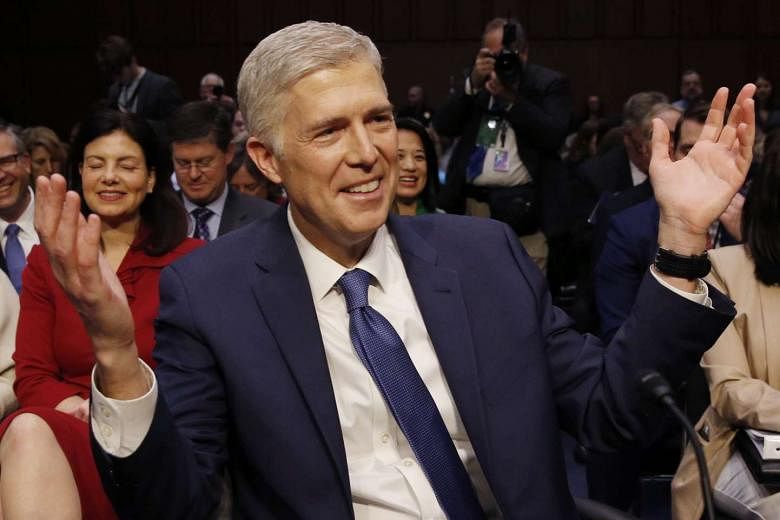WASHINGTON (REUTERS) - With the ideological balance of the Supreme Court at stake, a US Senate committee began its high-stakes confirmation hearing on Monday (March 20) for conservative appeals court judge Neil Gorsuch, President Donald Trump's nominee for a lifetime job as a justice.
Gorsuch entered the packed hearing room accompanied by Republican Senator Chuck Grassley, the plain-spoken Iowan who will chair the Judiciary Committee proceedings, greeting members of the audience and shaking hands with panel members, as a phalanx of photographers snapped pictures.
As the hearing got underway, he introduced his wife and other members of his family. "I appreciate all of the attention," Gorsuch said.
In his opening statement, Grassley said it was important to have jurists who do not exceed their powers. "Judges are not free to re-write statutes to get results they believe are more just. Judges are not free to re-order regulations to make them more fair. For sure, judges aren't free to update the Constitution. That's not their job."
"Fortunately for every American, we have before us today a nominee whose body of professional work is defined by an unfailing commitment to these principles. His grasp on the separation of powers, including judicial independence, enlivens his body of work," Grassley said.
Democrats were expected to try to case that Gorsuch is a pro-business, social conservative insufficiently independent of the Republican president. About 30 people in the audience wore red T-shirts emblazoned with #StopGorsuch.
Gorsuch, a cool-headed and amiable conservative federal appeals court judge from Colorado, likely will try to engage members of the Judiciary Committee without being pinned down on specifics that could trip up his nomination to the lifetime post. Gorsuch was due to deliver his opening statement later on Monday after members of the committee make theirs.
If Gorsuch, nominated by Trump on Jan. 31, is confirmed by the Senate, as expected, he would restore a narrow 5-4 conservative majority on the court. The seat has been vacant for 13 months, since the death of conservative Justice Antonin Scalia in February 2016.
The hearing which could go as long as four days, providing classic Washington political theatre.
Democrats can be expected to put up a fierce fight. They contend that Trump's party "stole" a seat on the Supreme Court when the Republican-led Senate last year refused to consider Democratic former President Barack Obama's nomination of federal appeals court judge Merrick Garland to replace Scalia.
Had Garland been confirmed, the court would have leaned to the left for the first time in decades. Since Scalia's death, the court has been split 4-4 between conservatives and liberals. The ideological leaning of the court could be pivotal in determining the outcome of a wide array of matters including the death penalty, abortion, gun control, environmental regulations, voting rights, immigration, religious liberty, presidential powers and others.
In a bid to place hurdles in the way of Gorsuch's confirmation, committee Democrats promise to question him on several fronts, focused on his record as an appellate judge and a Justice Department appointee under former President George W. Bush.
Conservative activists called on the Senate to confirm Gorsuch.
"It's very, very important we get Neil Gorsuch confirmed,"said Gregg Cummings, a member of the conservative Tea Party Patriots group who came from Lamoni, Iowa. "We need individuals that will 100 per cent stay with the rule of law and the Constitution, and he is one of those."
Among questions Gorsuch likely will face will be whether he is sufficiently independent from Trump, who has criticized judges for ruling against his bid to block people from a group of Muslim-majority countries from entering the United States. Another line of attack previewed by Democratic leader Chuck Schumer is to focus on rulings Gorsuch has authored in which corporate interests won out over individual workers.
Democrats will also press Gorsuch on his role as a Justice Department lawyer under Bush from 2005 to 2006, when he helped defend contentious policies enacted after the Sept. 11, 2001 attacks, including the administration's expansive use of interrogation techniques that critics called torture.
Gorsuch's views on social issues, including a 2006 book he wrote in which he argued against the legalization of assisted suicide and euthanasia, likely will be discussed, too.
Judiciary Committee members were scheduled to give opening statements on Monday and then take turns questioning the nominee on Tuesday.
Democrats face an uphill battle to block Gorsuch. Republicans hold 52 of the Senate's 100 seats. Under present rules, Gorsuch would need 60 votes in order to secure confirmation. If Democrats stay unified and Gorsuch cannot muster 60, Republicans could change the rules to allow confirmation by a simple majority.

